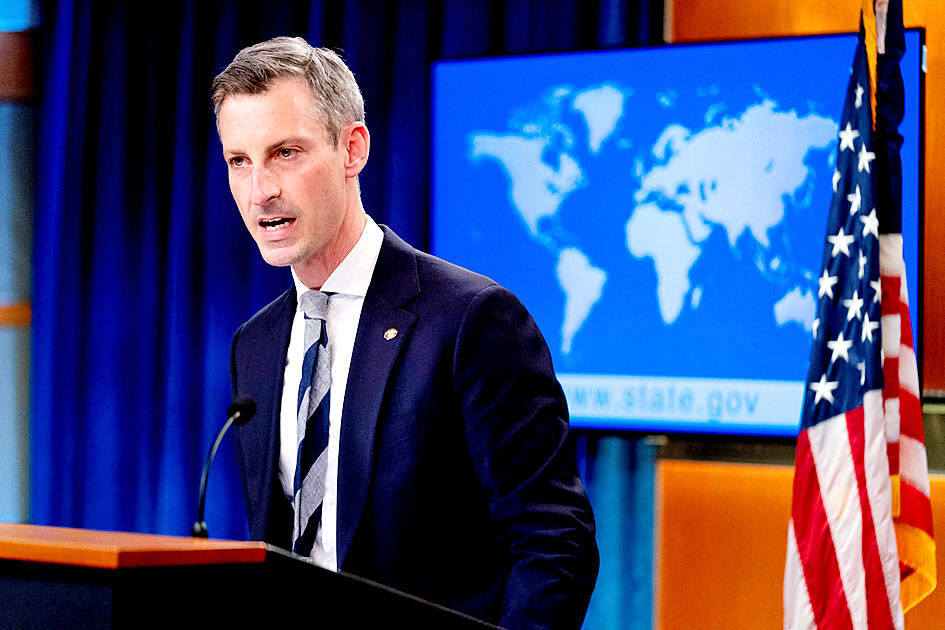US Department of State spokesman Ned Price on Monday said that Washington does not take a position on the sovereignty issue between Taiwan and China, a position not often explicitly stated by US officials.
Price was responding to a question at a news briefing on whether Washington’s “one China” policy supported the belief that “Taiwan is part of China and that the US respects Chinese territorial integrity and sovereignty over Taiwan.”
The US “does not take a position on sovereignty,” Price said, adding that Washington’s “one China” policy has not changed and has been at the crux of the US’ approach to Taiwan since 1979, when the US’ Taiwan Relations Act went into effect.

Photo: Reuters
That is a position that US Secretary of State Antony Blinken “made very clear in private” to Chinese Minister of Foreign Affairs Wang Yi (王毅) when the two met on Friday, Price said.
He did not further define the US’ “one China” policy, but said that the US wanted to see the “status quo” in the Taiwan Strait continued and preserved, as it had undergirded peace and stability in the region for more than 40 years.
China, which has become more “coercive and intimidating in its actions and maneuvers across the Taiwan Strait,” apparently does not share the same hope, he added.
Beijing has accused the US of hollowing out its “one China” policy and supporting Taiwan’s independence, and has stepped up military maneuvers near Taiwan, most notably after US House of Representatives Speaker Nancy Pelosi visited Taipei early last month.
It has been Washington’s long-standing policy to not take a position on Taiwan’s sovereignty, but US officials have rarely made known that stance publicly.
One such instance was when then-Pentagon press secretary John Kirby at a news conference on Oct. 12 last year spoke about the difference between the US’ “one China policy” and Beijing’s “one China principle.”
The US has long abided by its “one China policy,” which is distinct from Beijing’s “one China principle,” which asserts sovereignty over Taiwan, Kirby said at the time.
The US “takes no position over the sovereignty of Taiwan or on sovereignty over Taiwan,” Kirby said.
In May, Price wrote on social media that the US abides by its “one China” policy and does not subscribe to China’s “one China” principle, criticizing China for “continuing to publicly misinterpret the US’ policy.”

OPTIMISTIC: The DGBAS sharply upgraded its GDP growth estimate from 3.54 percent to 7.71 percent after the Taiwan-US trade agreement signing and given AI optimism The US imported more from Taiwan than China for the first time in decades, as US President Donald Trump’s tariffs reshape trade flows while a global boom in artificial intelligence (AI) fuels demand for tech products. US purchases of goods from China plunged almost 44 percent in December last year from 2024 to US$21.1 billion, US Department of Commerce data showed on Thursday. By contrast, shipments from Taiwan more than doubled during the same period to US$24.7 billion. The soaring Taiwanese shipments to the US reflect the huge expansion in supplies of chips and servers for AI companies, which has completely changed

NON-NEGOTIABLE: The US president’s action ran counter to one of the US’ ‘six assurances’ on not consulting China about arms sales to Taiwan, US lawmakers said US President Donald Trump’s admission that he is discussing arms sales to Taiwan with Chinese President Xi Jinping (習近平) is “alarming and a blatant violation of US policy and the six assurances,” US Representative Ro Khanna said on Tuesday. Trump on Monday said he would decide soon on whether to send more weapons to Taiwan, after Xi warned him not to do so. “I’m talking to him about it. We had a good conversation, and we’ll make a determination pretty soon,” Trump told reporters aboard Air Force One when asked about warnings raised by Beijing during a phone call with Xi over

The Central Election Commission has amended election and recall regulations to require elected office candidates to provide proof that they have no Chinese citizenship, a Cabinet report said. The commission on Oct. 29 last year revised the Measures for the Permission of Family-based Residence, Long-term Residence and Settlement of People from the Mainland Area in the Taiwan Area (大陸地區人民在台灣地區依親居留長期居留或定居許可辦法), the Executive Yuan said in a report it submitted to the legislature for review. The revision requires Chinese citizens applying for permanent residency to submit notarial documents showing that they have lost their Chinese household record and have renounced — or have never

US and Chinese fighter jets briefly faced off above waters near the Korean Peninsula this week, Yonhap News agency reported, marking a rare confrontation in that area between the two superpowers. About 10 US fighter jets on Wednesday departed an airbase in Pyeongtaek, South Korea, for drills above international waters off South Korea’s western coast, the news outlet cited unidentified military sources as saying. While the US planes did not enter China’s air defense identification zone, Beijing scrambled planes as they neared that region, the report said. “The Chinese People’s Liberation Army organized naval and air forces to monitor and effectively respond